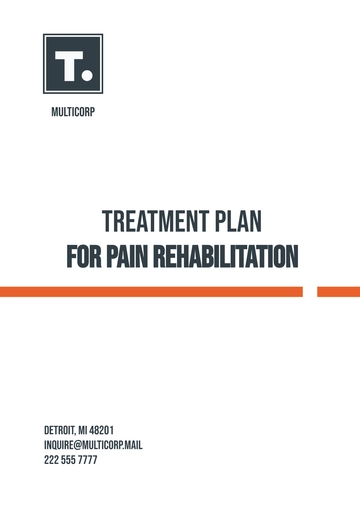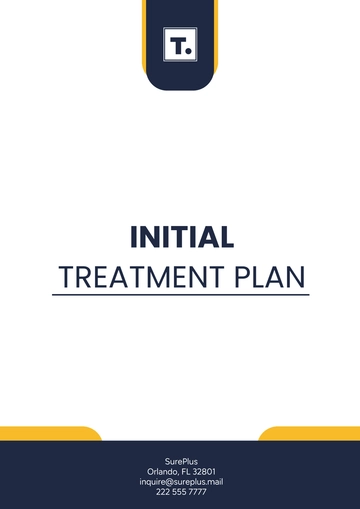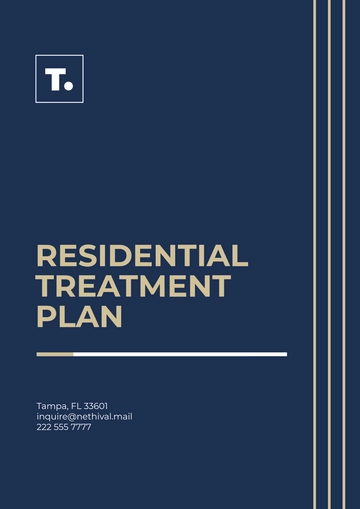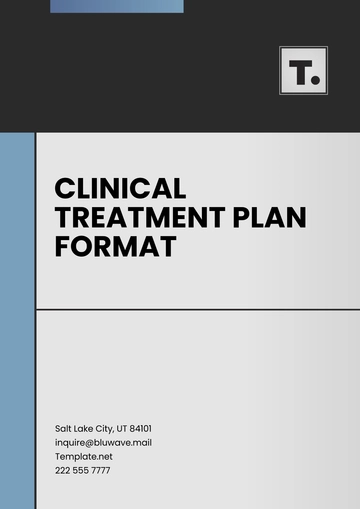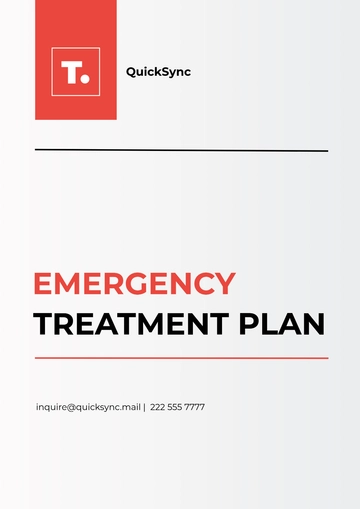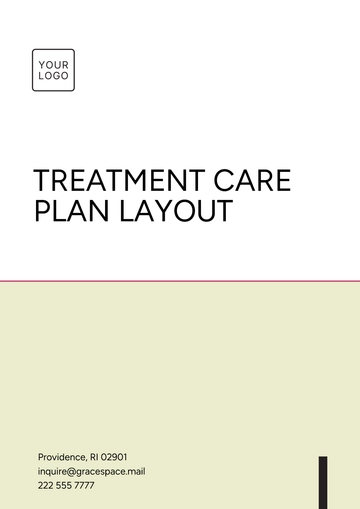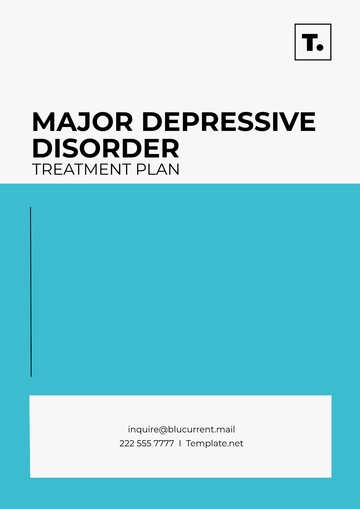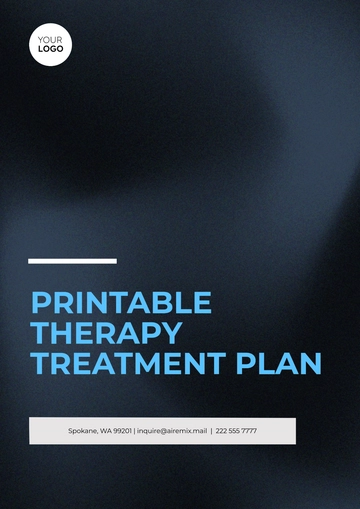Free Treatment Plan SMART Goals

Prepared By: [YOUR NAME]
Company: [YOUR COMPANY NAME]
SMART Goals Template
Section | Description |
|---|---|
S | Specific: Define the goal in clear and specific terms. For instance, "[Patient Name] will improve their mobility by walking independently for at least 15 minutes a day." |
M | Measurable: Quantify the goal to track progress and establish clear outcomes. For example, "[Patient Name] will increase lap time around the rehabilitation center from 10 minutes to 15 minutes over the next four weeks." |
A | Achievable: The goal should be realistic and attainable considering the patient's current conditions and treatment plans. For instance, "[Patient Name] will gradually increase walking time by adding one minute each day, considering his/her current physical capacity." |
R | Relevant: The goal should correlate with the broader treatment plan and promote overall health and well-being. For example, "This goal is relevant as it will improve [Patient Name]'s muscle strength, cardiovascular health, and independence." |
T | Time-bound: The goal should have a specific timeframe. For instance, "[Patient Name] is expected to achieve this goal within 30 days of the treatment plan." |
Action Plan:
Physical Therapy Sessions: Schedule and attend regular physical therapy sessions to work on mobility goals with a qualified therapist.
Daily Exercise Routine: Develop and adhere to a daily exercise routine tailored to the patient's abilities and goals, focusing on activities that improve mobility and strength.
Progress Tracking: Monitor and track progress towards the mobility goal regularly, adjusting the action plan as needed based on the patient's response to treatment.
Home Exercise Program: Provide the patient with a personalized home exercise program to supplement therapy sessions and facilitate consistent progress.
Accountability:
Therapist Guidance: Receive guidance and support from the therapist in setting and achieving mobility goals, with regular progress assessments during therapy sessions.
Patient Responsibility: Encourage the patient to take an active role in their care by adhering to the prescribed exercise program, attending therapy sessions, and reporting any challenges or concerns.
Care Team Communication: Maintain open communication between the patient, therapist, and other members of the healthcare team to ensure alignment of goals and continuity of care.
Notes/Reflections:
Progress Documentation: Document progress, setbacks, and any adjustments made to the action plan during therapy sessions and follow-up appointments.
Patient Feedback: Solicit feedback from the patient regarding their experience with the treatment plan, including any challenges encountered or improvements observed.
Celebrating Milestones: Celebrate achievements and milestones reached along the way to maintain motivation and reinforce progress.
- 100% Customizable, free editor
- Access 1 Million+ Templates, photo’s & graphics
- Download or share as a template
- Click and replace photos, graphics, text, backgrounds
- Resize, crop, AI write & more
- Access advanced editor
Introducing the Treatment Plan SMART Goals Template, exclusively available on Template.net! This editable and customizable tool is your key to effective planning and progress tracking. Craft tailored goals effortlessly with our Ai Editor Tool, ensuring flexibility and precision in your treatment journey. Streamline your path to success with this versatile template.
You may also like
- Finance Plan
- Construction Plan
- Sales Plan
- Development Plan
- Career Plan
- Budget Plan
- HR Plan
- Education Plan
- Transition Plan
- Work Plan
- Training Plan
- Communication Plan
- Operation Plan
- Health And Safety Plan
- Strategy Plan
- Professional Development Plan
- Advertising Plan
- Risk Management Plan
- Restaurant Plan
- School Plan
- Nursing Home Patient Care Plan
- Nursing Care Plan
- Plan Event
- Startup Plan
- Social Media Plan
- Staffing Plan
- Annual Plan
- Content Plan
- Payment Plan
- Implementation Plan
- Hotel Plan
- Workout Plan
- Accounting Plan
- Campaign Plan
- Essay Plan
- 30 60 90 Day Plan
- Research Plan
- Recruitment Plan
- 90 Day Plan
- Quarterly Plan
- Emergency Plan
- 5 Year Plan
- Gym Plan
- Personal Plan
- IT and Software Plan
- Treatment Plan
- Real Estate Plan
- Law Firm Plan
- Healthcare Plan
- Improvement Plan
- Media Plan
- 5 Year Business Plan
- Learning Plan
- Marketing Campaign Plan
- Travel Agency Plan
- Cleaning Services Plan
- Interior Design Plan
- Performance Plan
- PR Plan
- Birth Plan
- Life Plan
- SEO Plan
- Disaster Recovery Plan
- Continuity Plan
- Launch Plan
- Legal Plan
- Behavior Plan
- Performance Improvement Plan
- Salon Plan
- Security Plan
- Security Management Plan
- Employee Development Plan
- Quality Plan
- Service Improvement Plan
- Growth Plan
- Incident Response Plan
- Basketball Plan
- Emergency Action Plan
- Product Launch Plan
- Spa Plan
- Employee Training Plan
- Data Analysis Plan
- Employee Action Plan
- Territory Plan
- Audit Plan
- Classroom Plan
- Activity Plan
- Parenting Plan
- Care Plan
- Project Execution Plan
- Exercise Plan
- Internship Plan
- Software Development Plan
- Continuous Improvement Plan
- Leave Plan
- 90 Day Sales Plan
- Advertising Agency Plan
- Employee Transition Plan
- Smart Action Plan
- Workplace Safety Plan
- Behavior Change Plan
- Contingency Plan
- Continuity of Operations Plan
- Health Plan
- Quality Control Plan
- Self Plan
- Sports Development Plan
- Change Management Plan
- Ecommerce Plan
- Personal Financial Plan
- Process Improvement Plan
- 30-60-90 Day Sales Plan
- Crisis Management Plan
- Engagement Plan
- Execution Plan
- Pandemic Plan
- Quality Assurance Plan
- Service Continuity Plan
- Agile Project Plan
- Fundraising Plan
- Job Transition Plan
- Asset Maintenance Plan
- Maintenance Plan
- Software Test Plan
- Staff Training and Development Plan
- 3 Year Plan
- Brand Activation Plan
- Release Plan
- Resource Plan
- Risk Mitigation Plan
- Teacher Plan
- 30 60 90 Day Plan for New Manager
- Food Safety Plan
- Food Truck Plan
- Hiring Plan
- Quality Management Plan
- Wellness Plan
- Behavior Intervention Plan
- Bonus Plan
- Investment Plan
- Maternity Leave Plan
- Pandemic Response Plan
- Succession Planning
- Coaching Plan
- Configuration Management Plan
- Remote Work Plan
- Self Care Plan
- Teaching Plan
- 100-Day Plan
- HACCP Plan
- Student Plan
- Sustainability Plan
- 30 60 90 Day Plan for Interview
- Access Plan
- Site Specific Safety Plan



